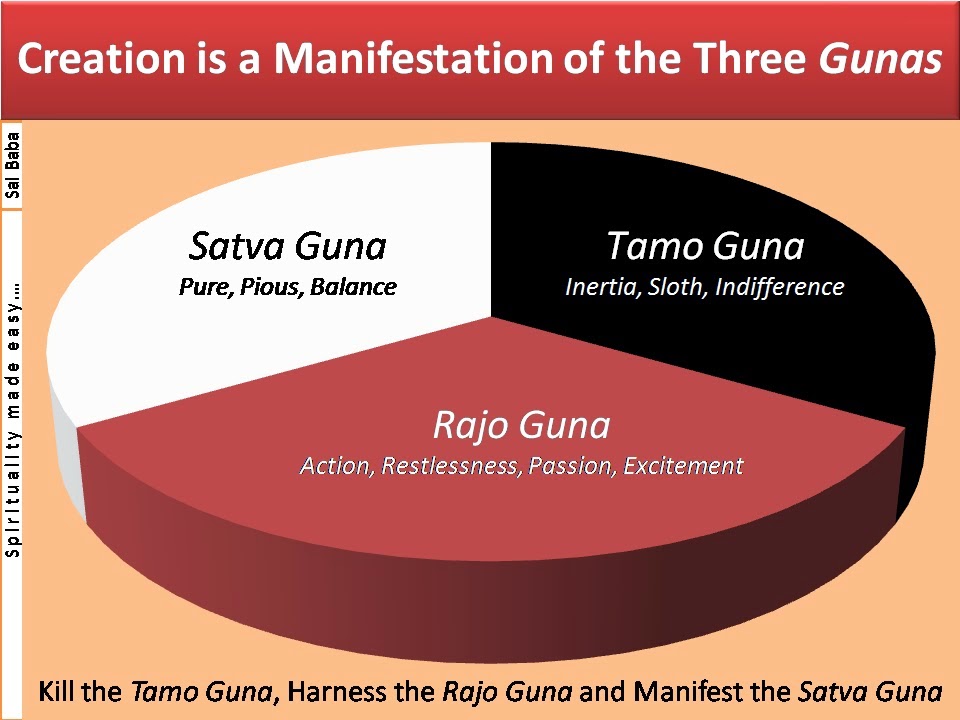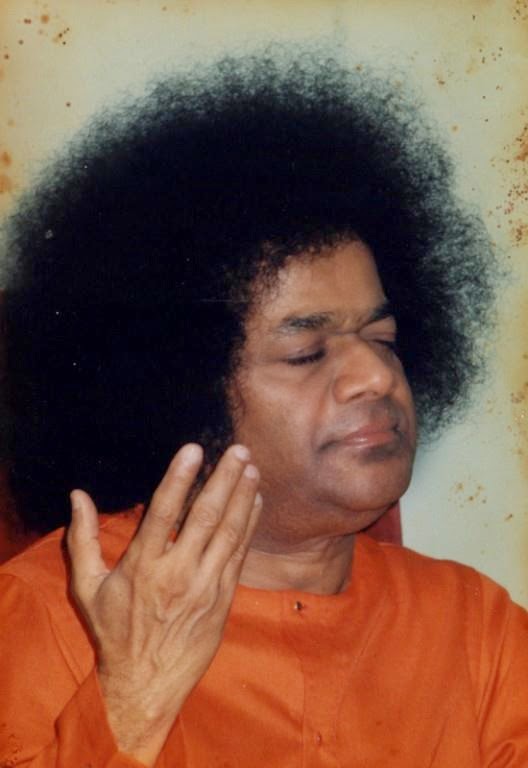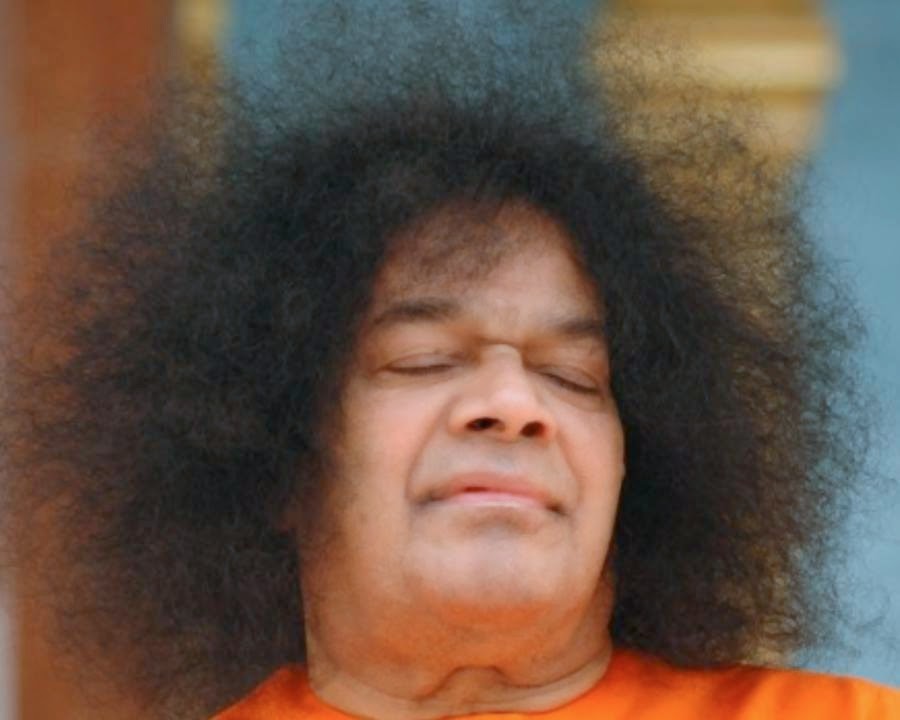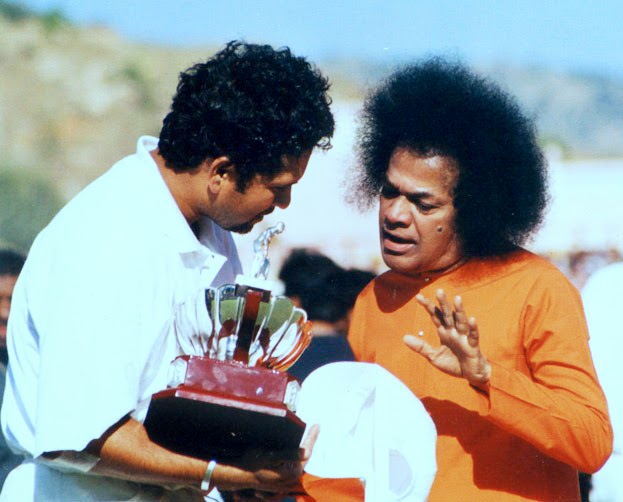08 December to 14 December 2014
What are the characteristics of the three Gunas?
What are the characteristics of the three Gunas-4.40-1988 January 08
 |
| Transcend the Three Gunas |
The entire world is the form of the three Gunas (attributes). It is a manifestation and a play of the three Gunas. The world is verily the embodiment of the three Gunas. Of the three Gunas, the Tamo Guna needs to be destroyed first. Tamo Guna means foolishness, stupidity and dull headed. Such a person questions each and every thing. We must first put a check on such a foolish mind and foolish arguments. We must enquire clearly into the things around us. We must then digest / assimilate the things that we have enquired into and understood. Only when we digest, we can acquire its strength. We must not get into an argument for every matter. These arguments only lead to increase in enmity but do not bring any peace. They can never show us the Truth. Thus, a Tamasicperson can never recognize the Truth, nor can He attain Divinity or enjoy sacredness. Their life is always a saga of birth and death – Punarapi Jananam Punarapi Maranam – to be born again and to die again.
The one with Rajo Guna will be very satisfied if his desires are fulfilled. If not, he becomes egoistic. If his desires are not fulfilled, he gets angry. Whether his desires are fulfilled or not fulfilled, it leads to only bad qualities. It does not yield the right type of fruits. Such people become dull and weak because of burning with anger and excitement. Rajo Guna develops qualities that will make a person’s blood “boil” (i.e. it leads to anger and restlessness).
The third quality is Satva. This quality also binds. One would get fulfilment only when one offers the sacred fruits of such Satvic actions to God.
Tamo Guna is identified with a particular colour. It is identified with black colour as it stands for darkness and ignorance. The black colour is a symbol of darkness. Rajo Gunaon account of rage and restlessness, heats the blood in the body and progressively speeds up its circulation, resulting in a red coloured face. The eyes too become red in colour. Thus, red is the natural colour of Rajo Guna. Next the Satvic quality. This is totally and absolutely pure. The white colour represents this purity.
08 January 1988
01 December to 07 December 2014
Why is Rajasic Sadhana not desirable as a means to attain God?
Why is Rajasic Sadhana not desirable as a means to attain God-7.46-1991 September 02
 |
| Rajasic Sadhana is not desirable… |
Only when we practice what we believe in, we would be able to develop our faith. It is because we do not practice what we believe in that our faith deteriorates. Our mind hovers only on the external mantra (sacred utterance), yantra (mystical diagrams or amulets) and the (physical) form. Here is a small example:
Once upon a time, King Vikramaditya donned the disguise of an ordinary man and toured around his kingdom. An old Brahmin was performing a Yajna(sacrificial offering) in a particular region. It was not clear as to how long the Brahmin was performing the Yajna, but the sacred ash coming from the sacrificial fire had piled up like a big hillock. The sacred ash of the Yajnaappeared like big mountains. King Vikramaditya saw this. He asked, “Swami, what is this task you are performing?” The Brahmin replied, “Son, I am performing Yajna since the last 60 years. All this ash is the dust rising from the Yajna. For the last 60 years I have been performing this difficult Yajna without taking rest even for a second. But I have not been able to win the grace of the Yagna Purusha (Cosmic being who presides over the Yajna). I have not been able to see His form. I am far removed from His Grace”. Saying so, the Brahmin lamented.
King Vikramaditya’s heart melted, watching the difficulties undertaken by this Pundit (priest). King Vikramaditya sat in meditation. He performed a very difficult penance. Inspite of performing the penance for a very long time, the Yajna Purusha did not manifest Himself. The king then asked himself, “What is the benefit of all the Sadhana (spiritual practices) that I have carried out? Why continue this life of mine that has not been able to earn the Grace of the Lord?” He drew out the sword carried by him in his robes. “What is the use of my life? Is life only about eating, living and growing one’s body every day? No, this is not the purpose of life. The supreme goal of my life is to see God.” Thinking so, he said, “O Yagna Purusha, as you did not give me your Darshan (holy vision), here I am offering my life to you”. Saying so, he drew out his sword whole heartedly.
The Yagna Purusha manifested instantly. He took away the sword from the hands of Vikramaditya. The Yagna Purusha said, “Vikramaditya, this is only Sahasa (courage or adventure) but not Sadhana (spiritual practice). Where am I?
Aham Vaishvaanaro Bhutvaa, Praaninaam Dehamaashritaha
Praanaapaana Samaayuktaha, Pachaamyannam Chaturvidham
(I am in the form of Vaishvaanara in your stomach and am digesting the four types of food eaten by you).
I am existent right within you (as Vaishvaanara – the digestive fire). On one hand you are attempting to kill Me (by killing yourself) and on the other hand you are attempting to realize Me (the one residing within you); is this the characteristic of Sadhana (spiritual pursuit)? I am right within you. This approach is only Rajasic (extremely active, excitable, or passionate)courage but not Sadhana. Devotees should never venture into such adventurous acts (in the name of Sadhana). The path to realize Me is the path of Love and not the path of adventure.
Whatever you do and whatever you see, feel the Divinity in it. Then work will be transformed into worship. The Brahmin mentioned above performed sacrifices from 60 long years. But the Brahmin had no idea about the meaning of the mantras being uttered by him. He was mechanically uttering those mantras as just words, thus generating mere noise. He was not invoking the Yajna Purusha with true genuine feelings. If the mind is focused on the mantras but the desire is focused on Me, how can he attain Me? I will manifest only before the one who worships Me by focusing his / her thoughts, words and deeds on Me. This is Trikarna Shuddhi (purity of the three). It is the unity of the mind, tongue and the body that is the primary goal. If one does not have the strength to carry out this, then let Him at least just follow My command. If I say, “Do this”, then just do that. Do not give scope to doubts such as “how can I do this?”
02 September 1991
24 November to 30 November 2014
Who is the true friend with whom we must make friend?
Who is the true friend with whom we must make friendship-1.04-1996 December 25
The one who has love, the one who aspires for Divine Love, he / she is My real friend. But today’s friends act in a contradictory manner. When there is money in the pocket and when father is in a good position, hundreds of friends come to you saying “Hello, Hello, Hello”. But when there is no money in the pocket and when father has lost his position, they would not even tell you goodbye! Is this friendship?
God is not like that. God is always with you, in you and around you. We should acquire such a good friend. Therefore, the real friend is God! We must try to associate ourselves with such a permanent friend.
25 December 1996
Birthday Special
23-11-2014
Birthday Message-When can one be truly happy?
Birthday Message-When can one be truly happy-2.54-1989 November 23
This morning when I came downstairs, all My boys told Me, “Happy Birthday!” I told them, “I am always happy. You people who are not happy, must experience happiness”. Therefore when every human believes in his Divine principle, acts according to it and experiences it, he will always remain happy. Divinity does not reside in some separate region or land. Divinity is not any specific form. We must recognize the fact that that we are verily the Divinity that is omnipresent, resident in all beings, the Atma in all beings, all powerful and omnipotent.
The subtlest among the subtle and the grossest among the gross, the principle of the Atma is verily Brahma and Brahma is verily the Atma. We must recognize this Truth. He is the one who has no birth or death; He has no beginning, end or middle; He is neither born nor does He perish nor can He be killed; He is the Truth that always exists and He is God.
Everything that changes is associated with this physical body. Taking the body that changes as the basis, we must experience the changeless Divinity. All this Diversity is based upon Unity. This is what the scholars refer to as, “Ekam Sath Viprah Bahuda Vadanti” (Truth is One, scholars describe it in different ways. Though there is only One, several scholars describe it in several different ways.
23 November 1989
Birthday Special
21-11-2014
What Birthday Gift does Bhagawan expect from us?
What Birthday Gift does Bhagawan expect from us-3.39-1990 November 23
Embodiments of Divine Atma! I do not desire anything from you nor am I asking anything from you. Just develop the principle of Love. Consider the entire humanity as your brothers and sisters. Consider everyone as the child of God. Do not develop hatred or jealousy towards anyone. Do not cause pain to anybody’s mind. Such kind of broad mindedness alone will give vast happiness to our life.
If we are all celebrating Swami’s Birthday today, then all you need to give Me is this one thing. All of you be united. Develop the ancient culture of Bharath once again.
When I was coming here, so many people wished Me “Happy Birthday, Happy Birthday”. I am always happy, I do not need any happiness. Convey your Happy Birthday wishes to those who do not have happiness. I have infinite happiness.
There is no day or a second, when I have been worried even for a moment. Why? Because everything is ephemeral; they are passing clouds. What is the use of worrying about such things? We should not worry, whatsoever, about birth or death. Neither should we get elated nor should we get depressed.
When we are born, we do not bring even a tiny piece of cloth with us. When we leave this world, we do not give our address to our kith and kin. Then how can others belong to us? All these are consequences of being in this creation.
So long as we are living, we should all mix with each other and spend our lives happily. We can put an end to all our problems only by thinking about (contemplating on) God. Forgetting God, believing in this world, what are you able to achieve? Have faith in God. Never develop differences on account of caste and religion and never develop hatred at any cost.
All names and forms belong to God.
Sahasra Sheerusha Purushaha Sahasraaksh Sahasrapaat
The (Cosmic) Being with Thousands of heads, thousands of eyes, thousands of limbs…
Purusha Suktam
All these are the Cosmic Form. Therefore, have faith in such Divine feelings. Remember the Divine name and sanctify your lives.
23 November 1990
Birthday Special
20-11-2014
How can we make Swami Happy on His Birthday?
How can we make Swami Happy on His Birthday-0.56-1994 November 23
How can we make Swami Happy on His Birthday-0.56-1994 November 23
Embodiments of Love! You all are considering this day as the 69th Birthday of Swami. I do not have any such desires. As I was coming here, so many people wished Me, Happy Birthday, Happy Birthday! I am always happy. Why do you need to wish Me happy birthday?
You be happy. Your happiness is My happiness. If you wish to be happy, then considering this as a gift to Swami today, offer three habits – consumption of non-vegetarian food, consumption of liquor and smoking; as offerings to Swami. By sacrificing these three, you will be fine, society will be fine and the country will also be fine.
23 November 1994
Birthday Special
19-11-2014
Why does Swami celebrate His Birthday?
Why does Swami celebrate His Birthday-2.02-1997 November 23
When you ask a student, “What Degree have you passed?” He may reply, “I have passed an M.B.A.”. Who has passed the M.B.A. programme? The degree is related only to the physical body. God has neither an M.B.A. degree nor a B.A. degree. God has no degree at all for that matter. There is only One and that is Nirgunam(attributeless), Nirmalam (pure) and Advaitam (non-dual). That is why God remains in bliss always.
When I was coming here (to the Mandir), many people wished Me, “Happy Birthday!” You may please wish those who are not happy. I am always happy. I do not need your wishes of happiness. God is in eternal bliss.
Swami does not like these birthday celebrations. But since you all have come here, this celebration is being organized for your satisfaction. I do not have any wish. You may believe it or not, but I do not have any desires. From head to toe, I am absolutely desireless. Whatever I do, it is only for you. Whatever I speak, it is only for you. You must recognize this Truth.
I have no enemies. No one is My enemy. No one hates Me. All are Mine. I belong to everyone. That is why, “Lokaa Samastaa Sukhino Bhavantu” (May the entire world be happy). That is My wish. Everybody should tread along the noble path. Everybody should get a good name. We must consider everybody as the embodiments of the Atma. We too must experience the principle of the Atma.
23 November 1997
Birthday Special
18-11-2014
When is the Real Birthday of Bhagawan?
When is the Real Birthday of Bhagawan-1.14-1998 November 23
Birthday is for this physical body. I have no birthday at all. Because you all have come here and because you all have this desire, I am regarding this as a birthday celebration. This birthday is not important for Me. That day when you all remain happy, is My real Birthday. I wish such happiness for all of you. It is this principle of Love that I wish for. It is this principle of sacrifice that I wish for. I need nothing else.
My true happiness lies in seeing all of you becoming embodiments of sacrifice, bliss, spiritual aspirations and thus experience Divinity. You all must set an ideal with your life, full of peace and security. You must develop noble feelings in your heart, on this sacred and Divine day.
23 November 1998
17 November to 23 November 2014
How should we sing the song
Love is My Form-Truth is My Breath?
How should we sing the song-Love is My Form-Truth is My Breath-2.46-1996 December 25
 |
| Love is God. Live in Love. |
Love has no limits. Love has no birth. Love has no death.
Love is My Form, Truth is My Breath, Bliss is My Food
My Life is My Message, Expansion is My Life
No reason for Love, No season for Love
No Birth, No Death
You sing “My Form”. It is not just My Form (Swami’s Form). Whoever is singing, it pertains to his/her form. You must say to yourself, “Love is my form”. My form is Love, Truth is my breath. You must feel like this about yourself (not just about Swami). Only then, you will unite with the principle of Swami.
“Love is My Form” – to regard this as God’s Form alone is of no use. “My life is my message, expansion is my life”. “My life is my message”; therefore, you are the messenger. If you consider yourself as the messenger, you must transform your life into the message. “No birth, no death”. There is no birth for Love, no death for Love.
Therefore, only when you relate what Swami says to your own self, you will be able to reach the final state of “I and you are One”. In Vedanta, this is referred to as Tat Tvam Asi (That Thou Art) and Aham Brahmaasmi (I am Brahman).
25 December 1996
Global Akhanada Bhajan Special
9th November 2014
What is the easiest way to worship God in Kali Yuga?
What is the easiest way to worship God in Kali Yuga-7.56-1996 July 12
 |
| It is easiest to reach God in Kali Yuga |
In those olden days there were no anxiety pills. Today, if there is any anxiety, you are given a pill (tablet) and that makes you totally dull. We must not take all these pills (tablets). What are the pills (tablets) that we need to take? We need to take the name of God.
Harer Nama Harer Nama Harer Namaiva Kevalam
(Complete verse with reference given at the end)
There is no other way. There is no other way. There is no other way other than chanting of the name of the Lord
This is most important in Kali Yuga. If we do Naama Smarana (chanting of the name of God), there is no medicine greater than this. Therefore, we must chant the name of God. It is only by singing the name of the Lord, we get peace, good fortune and joy. What is the mighty power in this age of Kali Yuga?
Naasti Naasti Mahaabhaaga Kali Kaala Samam Yugam
(Complete verse with reference given at the end)
Why is it that the kali Age is the mightiest and greatest among all ages?
Harer Nama Harer Nama Harer Namaiva Kevalam
It is the chanting of the name of the Lord, which is the appropriate medicine. In Kruta Yuga, it was Dhyanam (meditation); in Treta Yuga, it was Yajnam (sacrificial rituals); in Dwapara Yuga, it was Archanam (worship) and in Kali Yuga it is Naama Smaranam (singing and chanting the name of God). What an easy path this is. Compared to Kruta, Tretaand Dwapara ages, the Kali age has advocated a very easy path. However, we are not able to practice and follow even this easy path. We are unable to sit steadily even for two minutes. Then, how can we perform any Tapas (meditation)? This is not possible. That is why we must chant and sing the name of the Lord.
A boy (speaker) said now, “There is nothing greater than remembrance of God’s name”. Great scholars described and glorified texts of various subjects, scriptures, theories, etc. All these just got transformed into sound energy. But the truth was recognized by Shankara. He went to the scholars of mathematics and said,
Bhaja Govindam Bhaja Govindam (2)
Govindam Bhaja Moodhamate
Bhaja Govindam Bhaja Govindam
Govindam Bhaja Moodhamate
Sampraapte Sannihite Kaale (2)
Nahin Nahin Nahin Rakshati Dunkrun Karane
Nahin Nahin Rakshati Dunkrun Karane
Bhaja Govindam Bhaja Govindam
(Bhaja Govindam, Adi Shankaracharya)
O foolish man, sing the name of Govinda
When the end (of your life) approaches, no rules of grammar will come to your rescue
Yogaratova Bhogaratova
Sangaratova Sangaviheenah
(Complete verse with reference given at the end)
One may take delight in yoga or bhoga, one may have attachment or detachment.
All these are so trivial. What is this Yoga (spiritual practices), what is this Bhoga (pleasure)? All these are Roga (disease). Our Raaga (desire) is our greatest Roga(disease). We must not cross the limits of our Raaga. (Incidentally, Raagaalso means melody or musical notes in music). There must be no wrong note in the music. Only then the music will be melodious and will fill the listeners’ hearts with feelings. Otherwise the same music will become stinking, full of foul smell. Therefore, we must first achieve beauty and order. We can acquire this only by thinking of God.
We must chant the name of God, gradually pacifying all the bad qualities existing within us. There is so much joy in this singing. That is why God is referred to as Gaana Lola and Gaana Priya(lover of music). Narada and Tumbura always keep singing the name of God, staying near Lord Narayana. That is their job for full 24 hours. God in turn becomes intoxicated with their music. There is so much of joy in that singing. It attracts the mind. It makes us forget ourselves and delights our heart. It intoxicates everything with bliss. This is the great value that music has got.
Even if we do not know the Shruti (pitch), Raaga (melody) or Tala (rhythm/beat), the song of yearning must emerge from an overflowing heart. There are three paths for remembering the name of God. We may pray to Him through words.
O Rama Nannu Kaapaadu Ra (O Rama save me)
We can say so in words or as prose.
We could also present the same as poetry:
O Rama Nannu Kaapaadu
However, both these would not be that pleasing and melodious. If the same is sung as:
Rama, Nannu Kaapaadu
It just attracts our heart. There is so much of sweetness and bliss in songs. That is why, as Narada has no work, no family, no house; he always keeps singing Narayan, Narayan, Narayan. He keeps on chanting this name.
Govinda Damodara Narayana (2)
Govinda – Damodara
12 July 1996
Complete verses with reference
Harer Nama Harer Nama Harer Namaiva Kevalam
Kalau Nasty Eva Nasty Eva Nasty Eva Gatir Anyatha
(Brhan-naradiya Purana 38.126)
In this age of quarrel and hypocrisy, the only means of deliverance is the chanting of the holy name of the Lord. There is no other way. There is no other way. There is no other way.
Naasti Naasti Mahaabhaaga Kali Kaala Samam Yugam
Smaranath Keerthanaat Vishno Prapyate Paramam Padam
(Pandava Gita ??)
O great fortunate one! There is no age, there is no age equal to the
Kali Yuga, during which the Ultimate Supreme Goal is attained simply
by the loving remembrance and devotional chanting of the Holy Name
of Vishnu.
Yogarato Vaabhogaratovaa
Sangarato Vaa Sangaviihinah .
Yasya Brahmani Ramate Chittam
Nandati Nandati Nandatyeva
(Bhaja Govindam, Verse-19)
One may take delight in yoga or bhoga, one may have attachment or detachment. But only he whose mind steadily delights in Brahman, enjoys bliss, no one else.
10 November to 16 November 2014

.jpg)
.jpg)






















